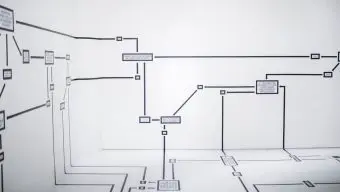How Losing the Middle Class Broke Politics
*If video doesn’t load, click here.
Why are anti-democratic politicians and parties on the rise? David Leonhardt, Editorial Director of New York Times Opinion, sits down with Manuel Muñiz to discuss prosperity, immigration, and the crisis of trust reshaping democracy.
© IE Insights.
Transcription
Manuel Muñiz (MM): Well David, it’s wonderful to have you here. I have a few questions for you, but I want to begin with a question on the state of democratic politics, which is something that you’ve written extensively about, and you’ve highlighted that democracies are under significant internal pressures of different kinds; cultural changes, economic changes that are affecting political behavior, political preferences within democracies, that is leading to the rise of a more authoritarian kind of politics, even within democracies now.
David Leonhardt (DL): It’s great to be here, thanks for having me. I’m an optimist by nature, and I don’t think I ever expected to be as concerned about the state of American democracy and what you might call Western democracy in my life that I am now. And so, why is it that so many people in both the United States and in Europe are supporting either anti-democratic politicians in the case of President Trump or anti-democratic parties in the case of much of Europe?
DL: And even though the anger often takes a form that I really lament, I understand why people are frustrated. If you look in the United States, and you look at life expectancy. Life expectancy, which I would argue is essentially the most meaningful measure of how a society is doing by its citizens life expectancy, in the United States for people who have not graduated from a four-year college has stagnated even before Covid.
DL: And that’s a fundamental indictment of how our society is serving more than 50% of our citizens. The specifics in Europe are different. You’re doing better on life expectancy. But the European economy, it’s no secret, has really been struggling, struggling more than the American economy. And so while the reasons are different, I think fundamentally people have good reason to be frustrated with elites, politicians, intellectuals, journalists.
MM: And this is I mean, to be quite frank, is one of the strengths of democracy. You know, that it allows for these things to bubble up and to be very evident, through the electoral process and the preferences that people are expressing in the ballot box. So there’s a silver lining to populism and nationalism which is its red flag.
MM: I mean, it’s telling you it’s a clear signal that there are points of pain within your societies that need to be addressed. And I think we’re seeing this in the West. This idea of the hollowing out of the middle of our income distribution, the hollowing out of our middle classes, and how this is highly correlated with the hollowing out of the middle of our political spectrum.
MM: So this process of polarization is very connected to the weakening of our middle classes. This happens in a moment of immense aggregate prosperity. We’ve never been more prosperous than we are today in the aggregate, with record levels of GDP, in many places, we’ve never lived longer lives, particularly certain groups within our society. So you have this huge disparity. But, some people have access to the best health care ever in the world, access to information and to education unparalleled. So we’re failing at the management of prosperity. And I agree with you that we need to look at this head on. Is there anybody out there, any government, any institution that you think is really looking at the root causes, honestly trying to address them and putting policies forward that would address these issues?
DL: I don’t think there’s any government that’s getting it right on everything. The United States, for example, in terms of aggregate economic output, is really doing quite well. However, when you look at the economic experience of an individual family, a typical family, the United States is not doing that well. So inequality is a huge problem. And then even worse, the United States is doing a really bad job at translating money into good lives.
DL: That is how it could be that the United States is both pulling away from Europe in terms of GDP and falling behind Europe in terms of life expectancy, in terms of delivering decent lives to people through a social safety net. Europe is doing a better job than the United States. If you get sick in Europe, you have access to health care in a way that is more questionable in the United States.
DL: I think one issue that very much plays into the populism and that plays into the failure of the political mainstream is immigration. Voters in the United States and Europe have consistently made clear that they want less immigration than we’ve had over the last 30 years. Not no immigration, but less immigration. And both the center left in the center right, the political mainstream has consistently disdained that opinion.
DL: They’ve said to people, “No, you’re wrong. Immigration is good for growth. You should like immigration.” And people keep saying again and again, “no, we want less immigration.” And mainstream politicians keep trying to correct them. And voters then go to the one place in the political spectrum that takes them seriously: the far right. And I recently spent some time in Denmark.
DL: The center left in Denmark said quite clearly, restricting immigration is in fact part of the progressive project, and they’ve marginalized the far right there, and they have been reelected. And I know that the Danish Social Democrats’ attitude toward immigration makes a lot of people in Europe uncomfortable. But I would hold that up as a model of taking public opinion seriously. And trying to implement a policy that has more support among the citizens of a democracy.
MM: The Labour government in the U.K., as well, has just produced a turn on this issue on the immigration issue, a progressive European government as well, deciding to implement the stricter policies.
MM: The issue there is that, of course, the economic demographic argument, etc. is very much in favor of immigration because we have a demographic problem, clearly in Europe and in many parts of the world. Part of the answer might lie in immigration, but I think there’s no social majority in most of our countries for that to be the core solution to a demographic economic problem.
MM: But I agree with you that consistently, I think voters in Europe have expressed big doubts and in the US about the idea that we’re going to solve all of these problems exclusively through very large numbers of immigration that then need to be integrated. Although I should tell you that in this very country, in Spain, we’ve had a lot of immigration from Latin America, we’ve gone from having basically zero foreign-born population, you know, in the 70s, 80s after Franco, to having two digits of foreign-born population, very well integrated on the whole, but of course, it came from Latin America.
MM: And there are real benefits to this language, culture, history, etc.. One of the other manifestations of this is concerns about the future and how highly correlated that is with support for extremist forces in the political spectrum. But isn’t it curious that then this would lead to a vote for political forces that will almost certainly undermine the welfare of those very groups through tax reforms that are deeply regressive through attacking the international trading system. Many of the political responses to this has been Euro skepticism, that will most likely hurt the middle class in these countries. Or am I missing something?
DL: No, I agree with that. I think I understand it that even if I lament it. This is going to be an overgeneralization, but I still think directionally it can be a helpful way to think about what’s happened in the world. The globalization of the 1990s and the early 21st century has been very, very good on net for the citizens of poorer countries.
DL: And it has been very, very good for the richer citizens of richer countries. “We have got to stop sending jobs overseas, claims 30,000 Michigan jobs have been lost to Mexico.” It has not been so good for the working class and the lower-income citizens of richer countries. And that is precisely where we see the political rebellion right now.
DL: And to some extent, what people are saying is, “the status quo isn’t working for me. It’s not working for my family. It’s not working for my community.” These are also outside of the very biggest cities. It’s not Madrid and New York that are rebelling. How can the center right and the center left appeal to these voters, rather than simply telling them they’re wrong?
DL: Or there’s this line that the Democratic Party uses that I think is a terrible line. Voters are voting against their economic interest. Don’t tell people that. And by the way, rich people vote against their economic interests all the time. They vote for tax increases on themselves because they care about climate change.
MM: I feel very tempted to ask you about this, given your role in the New York Times and your leadership of the opinion pages there. Because one of the big accusations is that we’ve been deaf. That they’ve been deaf to the needs of these people, to their voices that in some cases extraordinarily condescending, you know, the deplorables.
MM: I mean, all of these labels, this idea that they were acting against their interests and hence irrationally. But the media has also been a part of the object of attack. It wasn’t covering the right stories, it wasn’t giving voice to these people in these communities. Do you see yourself as someone that has an obligation to give voice to this, to shine a light on these experiences, on these stories?
DL: Our job is to cover the world as it is, and we try very hard to do that, and we do it imperfectly. What we have seen in, both Europe and the United States is this real divide between roughly, people who have a college degree and people who don’t. It’s a pretty good simplification of where the line is.
DL: Journalists used to be a mix of people who had a college degree and didn’t. Now, of course, it’s overwhelmingly people who have college degrees. That’s probably not going to change. I think that makes sense. But I do think it puts an obligation on us not to simply think that the whole world is the way that we are, and to think about our own blind spots.
DL: So in the United States that involves something like hunting. It involves religion. It involves attitudes toward gender, including trans issues. It involves patriotism. And if we define as the only reasonable position, one that we happen to be surrounded by in our communities, we will end up failing at our mission to cover the world as it is, because we will have blind spots.
MM: This is true in the academic space as well, by the way. I mean universities, I think we have a high responsibility in bringing truly diverse voices into our campus and a perspective on different things. I was at Harvard when Trump won the elections the first time, everybody was convinced this was not going to happen. Then they were very surprised that this happened.
MM: And then the thinking was, he won’t finish the term. You know, this won’t happen again. It’ll be an oddity. And here we are, this blindness, to some extent, that we’ve had in institutions that are supposed to be dedicated to understanding the world as it is. I think it’s very important that those of us that have this function display it objectively.
MM: And can bring these voices and these stories and these realities into our classroom, onto our pages, etc. I wanted to ask you, where do you see U.S. politics and the U.S. institutional architecture domestically in the next 4 or 5 years?
DL: The more important force is the force that gives the institutions credibility, which is in democracy, the popular will. And so I don’t know what’s going to happen in the US. What President Trump is doing in terms of pushing the limits of democracy and frankly, behaving in anti-democratic small-d ways, in many ways, is extremely alarming. If you want to look for reasons for optimism, he is already less popular than the leaders of other countries who essentially took their democracies and made them less democratic.
DL: Early on, Viktor Orban in Hungary, Narendra Modi in India, Erdoğan in Turkey, were all much more popular than Donald Trump now is in the United States. The relative unpopularity of him right now and his administration will make it harder for him to consolidate power, and easier for his opponents to rally and protect democracy. I think in the longer term, what is deeply important is to reflect on this question of why have they lost the voters?
DL: And that’s one of the reasons why I talk so much about immigration. Telling people not to care about an issue, or to have a different opinion than they have, will usually fail. The hopeful story for the United States is that either the non-Trump Republican Party, or more likely, the Democratic Party, will reflect on why it has been so unpopular and thus can emerge more strongly.
MM: So, given the nature of the administration in the US, what are we to expect of the of the US in foreign policy in the next 3 or 4 years?
DL: The US-Europe relationship will worsen, almost entirely, or at least mostly, because of the fault of the United States over the 3-4 years. I hope that Europe will reflect on some of the reasons why the United States, or parts of it, have grown so frustrated with Europe. Europe really does need to spend more on the military and stop outsourcing so much of its defense to the United States.
DL: Europe does need to think about why its economy has been struggling to produce growth the way the United States has. And Europe does need to reflect on the fact that it has had this massive influx of migration that is unpopular with most of its citizens. If we get to a point where the US is ready to engage again, Europe will be a stronger partner. Perhaps it’s stronger than it was in some ways in 2015.
MM: I agree with you that one of the silver linings of this administration is that it’s going to put immense pressure on Europe to do things that it should have done a long time ago on security and defense, but also on the perfection of its single market, the deepening of our single market, which has many flaws and can be perfected and should, in the face of a tariff crisis.
MM: So it’s really the time for Europe to react. And this might produce a stronger Europe and a more reliable partner and stronger partner moving forward.
DL: And you’re going to have opportunities because Canada is going to want to deal with you. The UK obviously wants to deal more with Europe. You can imagine the same being true of Australia and other countries. And so Europe in some ways can be at the center, in the way the United States was at the center before Trump.
MM: Well, let’s see if Europe reacts. In the past, you know, Europe has moved forward through crises, and the security landscape is changing in ways that it hasn’t changed for us in 70 years. So that’s an opportunity for us to do something. David, thank you so much. Thanks for being here. And I hope we have a wonderful set of discussions moving forward.
DL: Thanks for having me.










